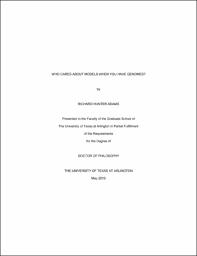
ATTENTION: The works hosted here are being migrated to a new repository that will consolidate resources, improve discoverability, and better show UTA's research impact on the global community. We will update authors as the migration progresses. Please see MavMatrix for more information.
Show simple item record
| dc.contributor.advisor | Castoe, Todd | |
| dc.creator | Adams, Richard Hunter | |
| dc.date.accessioned | 2019-05-28T15:58:19Z | |
| dc.date.available | 2019-05-28T15:58:19Z | |
| dc.date.created | 2019-05 | |
| dc.date.issued | 2019-05-14 | |
| dc.date.submitted | May 2019 | |
| dc.identifier.uri | http://hdl.handle.net/10106/28076 | |
| dc.description.abstract | There is no question about it: genomic data are revolutionizing biology. This is certainly evident
in the fields of population genetics and phylogenetics for which genome-scale analyses have
been used to study a myriad of evolutionary processes and organismal relationships across the
Tree of Life. While genomic data have unquestionably advanced our understanding of biology
by incredible leaps and bounds, the ease and affordability of generating such large and complex
data has unfortunately, in some circumstances, led to the idea that simply “throwing more data”
at a particular evolutionary question is likely to be sufficient. This notion has led to an emphasis
on obtaining larger datasets with the hope that one can overcome most any obstacle by simply
increasing the sample size without considering the fit of these large, complex datasets to the
highly oversimplified models that we often use to analyze these types of data. The title of my
dissertation represents a rhetorical sarcastic question that my research has addressed. | |
| dc.format.mimetype | application/pdf | |
| dc.language.iso | en_US | |
| dc.subject | Population genetics | |
| dc.subject | Phylogenetics | |
| dc.subject | Molecular evolution | |
| dc.subject | Coalescent theory | |
| dc.title | WHO CARES ABOUT MODELS WHEN YOU HAVE GENOMES? | |
| dc.type | Thesis | |
| dc.degree.department | Biology | |
| dc.degree.name | Doctor of Philosophy in Quantative Biology | |
| dc.date.updated | 2019-05-28T15:58:22Z | |
| thesis.degree.department | Biology | |
| thesis.degree.grantor | The University of Texas at Arlington | |
| thesis.degree.level | Doctoral | |
| thesis.degree.name | Doctor of Philosophy in Quantative Biology | |
| dc.type.material | text | |
Files in this item
- Name:
- ADAMS-DISSERTATION-2019.pdf
- Size:
- 16.37Mb
- Format:
- PDF
This item appears in the following Collection(s)
Show simple item record


